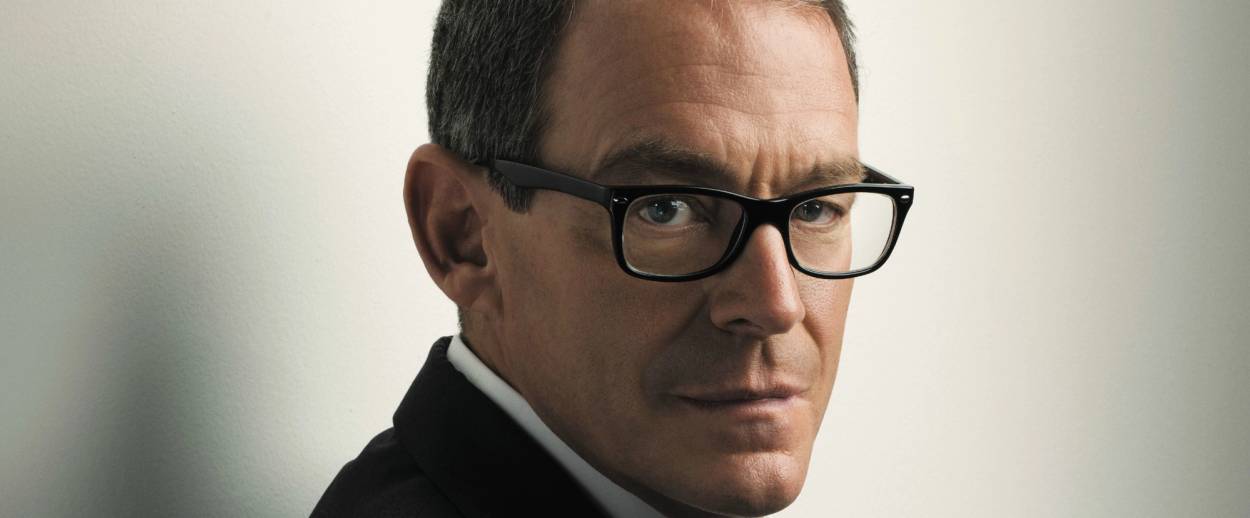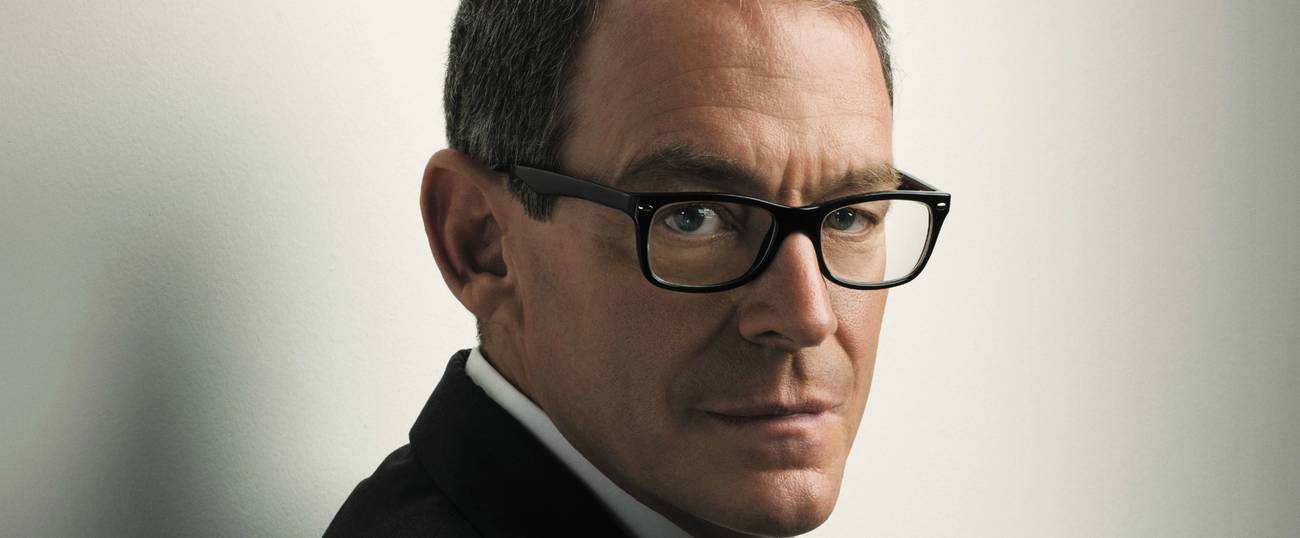A Conversation with Daniel Silva
The best-selling novelist, whose latest book was published today, talks ISIS, writing while watching the news, and his famous protagonist, Israeli master spy Gabriel Allon




With so much of the news feeling like a poorly written novel these days, it’s a pleasure to have well-written fiction to distract us, especially if it also provides the sort of insight into war, terrorism, and the brinksmanship of the global espionage game that the press too rarely gets right. It’s a difficult art to master, and it helps if, like Daniel Silva, one is not only a former reporter who gets the story just right but also an elegant writer who knows how to tell it briskly. Today marks the publication of House of Spies, Silva’s newest novel and the 17th to feature Israeli super spy Gabriel Allon. Any attempt to summarize the novel’s intricate and beautifully woven plot are bound to do it needless violence. But, this being Silva, the action spans the globe, the characters are complex and compelling, and the story, which kicks off with a terrifying ISIS attack in London, feels frighteningly timely. I spoke to Silva about trying to write novels while watching the news, about his famous protagonist, and about what happens when reality interferes with his plot lines.
Q: What’s it like being you and reading the news? Are you distracted by it? Inspired? Terrified?
A: I’m constantly, obsessively writing and creating, and so I cannot read The New York Times on any given day without seeing a novel or two behind the news. Particularly with what’s going on in the region and in the Middle East these days, and having a character like Gabriel, let’s just say I have no shortage of ideas about what to do next. Or take what’s going on domestically with Trump and the alleged Russia connection: I’ve written two novels about Russian meddling in Western politics, and it’s sort of bizarre to see it come true. I wish it hadn’t, but they’ve been meddling in other people’s elections for a long, long time, and then it came true here.
Q: And when something like that happens, when your plotlines seem to come to life, do you congratulate yourself on being such a great novelist? Or do you tear your hair out and scream, “Oh my god, reality is catching up with my imagination”?
A: I think that our constant exposure to news and information has changed thrillers. 9/11 did as well. Back in the 70s, when I started reading, you could be over-the-top with big plots and wild conspiracies. Now everyone is so in tune, and I write my books with the realization that people may be reading it on their phone or on their iPad, and they’re googling along with the story. So I think the hyper-information age that we live in has changed the way someone like me goes about the craft. That said, I long for the old days. I hate having to keep up with technology and I hate putting technology in the book.
Q: Does knowing that people are googling along with the plot change the way you practice your craft? You come from a journalistic background; how do you keep from being drowned by CNN, say?
A: I try not to worry about that, but I do think about what is happening on the global landscape. As an example, here is an excerpt from my new book that I wrote last September. The head of MI5 and MI6 are together in an office:
“BBC flickered on a flat-paneled television. British and American forces are striking ISIS targets in the Syrian city of Raqqa. The Iraqi portion of the caliphate had largely been reclaimed by the central government in Baghdad.”
Now, almost a year later in real life Mosul fell this weekend.
This is the second of two books that deal with ISIS. I wrote the first one, The Black Widow, when ISIS was ascendant, and I tried to anticipate that it would make the transition into a global group. And that is what happened. And then I had to anticipate the decline and fall of the caliphate and how they would react in House of Spies, the new book, and now that’s happening as well.
Writing these novels involves a tremendous amount of research, of thinking and speaking to people and trying to make it seem like what’s going on in the book could actually be happening in the universe.
Q: You’ve created probably the best-known Israeli persona in America after, say, Gal Gadot. What’s it like being the father of Gabriel Allon?
A: I never intended him to be a continuing character. He was supposed to appear in one book and one book only. I had to be talked into writing the second book because I thought there was too much anti-Israeli sentiment in the world, and, frankly, too much raw anti-Semitism in the world for an Israeli character to ever work in a truly mass market. But a very smart publishing figure named Phyllis Grann said, “No, you’re wrong, write it.” So I did. And I’m glad I did. All that said, I think there are plenty of people, here and in Europe, who may not pick up the book because it’s hero is an Israeli character.
Q: Have you ever encountered any of that anti-Israeli animosity? Has anyone ever come up to you and said something?
A: Not really. Once in a while someone pops off at a dinner party—sometimes people just can’t help themselves.
Q: And you don’t even bother engaging, I assume. Or do you?
A: No. As Gabriel Allon has said famously, once or twice, these arguments take on the quality of a cat chasing its own tail.
Q: Reading this book, and knowing your background as a journalist, it felt like the roles were reversed: journalists these days too often busy themselves with silly fantasies, and leaving novelists like yourself to report and provide context. Do you feel that way?
A: I want to explain to the reader how we got here. What mistakes did we make? How did we end up in this situation? It is a work of fiction and I dramatize it, but I also try to take a few pages to explain what and who ISIS is.
Q: And do you feel that this kind of writing has an ability to penetrate and educate in a way that the sort of routine drumbeat of news simply doesn’t have?
A: Absolutely. Because it’s dramatizing it, and I think I’m a pretty astute observer. I try to insert the necessary background and digestible snippets within the stories that don’t bog things down. I feel strongly that we made a mistake in allowing this group to take root and to sit there for so long, and I am afraid we will be paying the price for that miscalculation for a long time to come. And so I wrote a book about it.
Q: But writing about such timely stuff, do you ever wonder what will happen if reality sudden takes a sharp turn? I mean, you wrote this new book last September, and just a short while later we got Donald Trump.
A: Well, I actually anticipated Trump. But what really bit me once was a book I wrote a few years ago called Portrait of a Spy that was trying to catch the Arab Spring in the act. I had a book coming out in July, and Osama bin Laden, who was not a character in the novel but who’s referenced as a living person, is killed. My wife was working for NBC at the time, and the phone rings in the middle of the night, and I’m asleep, and she says, “wake up, wake up, wake up! We got Bin Laden!” And my first reaction is, “Oh shit.” While the people are streaming to the White House to celebrate, I’m sitting there with my galleys on my lap in bed that night, finding the references and rewriting the passages. Sometimes events will rise up and get you. It could happen with this book! But I felt that the last two books have a historical arc to them, and I anticipated the arc correctly and was able to write into it.
Liel Leibovitz is editor-at-large for Tablet Magazine and a host of its weekly culture podcast Unorthodox and daily Talmud podcast Take One. He is the editor of Zionism: The Tablet Guide.